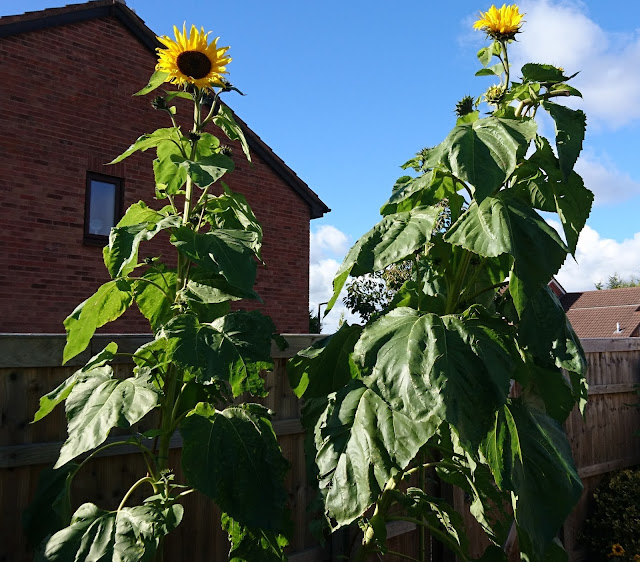A guide to feeding plants
This year as I have been writing 'how to grow' guides for the NMC, I have become increasingly baffled by all the different types of plant feed I was reading about - seaweed, bone meal, high potash, chicken manure pellets and more. I have always used tomato feed on everything I grow but this year have found myself questioning whether it is the right thing to do or whether the many types of feed available are some sort of trickery to get me to buy a lot of products I don't really need. In order to try and de-mystify myself and to help others I have put together this guide.
All photos by Toni Abram.
 |
| Giant yellow sunflowers. |
The science bit
All plants need three nutrients in particular.- Nitrogen (N): encourages leaf growth
- Phosphorous (P): helps the roots
- Potassium (K): also referred to as potash, for healthy flower and fruit development
 |
| Bottle of tomato feed showing the nutrients contained in it. |
Why is it necessary to feed plants and when to feed them
Plants need feeding if they are:- showing signs of nutrient deficiency
- producing a low amount of flowers or fruit
- putting on less growth than expected (but appear otherwise healthy and are growing in suitable conditions).
 |
| Image by GrowREALFood. |
When should you feed your plants
Plants in containers need regular feeding, as they only have the feed that you give them. Plants in beds and borders are able to use the resources found in garden soil and may not need feeding at all.Feeding is usually done in spring or summer, during the growing season. Few plants need fertiliser in the winter months, even if they are winter flowering, although some organic fertilisers, such as fish blood and bone or poultry manure pellets, are slow to release their nutrients, so should be applied in late winter or early spring in preparation for the growing season.
Plants not to feed
- Aromatic plants with a mediterranean provenance: these have deep root systems that seek out food and water so are often best left to their own devices
- British wildflowers: prefer low nutrient soils
- Leguminous plants (sweet peas, beans and garden peas): these make their own nitrogen through root nodules - if you apply lots of nitrogen you’ll produce lots of leaf at the expense of flowers.
Do packeted fertilisers work on their own?
Good soil structure is also important for plant health, so fertilisers alone will not improve your plants, as a fertilisers efficiency relies on your soil having plenty of air gaps for root development and water dispersal. Garden compost, well rotted manure (either dug in or used as a mulch that’s pulled down by worms) is also vital for your plants. Garden centres sell sterilised well rotted manure, or you can learn how to make your own garden compost, here on the NMC Gardening Times website.Make your own feed
Comfrey
You can make potassium feed by soaking comfrey leaves in water for a week to make comfrey tea. Comfrey can be found alongside canals and in town marshes.
Nettles
You can make nettle tea by soaking nettles in a bucket of water for two weeks. The resulting brew is high in nitrogen and other nutrients. Remember not to add too much nitrogen to fruiting crops though as you may get lots of leaves and not many fruits.
Helpful hint: Want to make a liquid feed go further? Try spraying it on to the leaves of your crops using a hand spray.
Worm compost
Worm compost is rich in vitamins, minerals and nutrients. It is good for container plants and for adding soil life to new compost.
How much should you feed your plants
How much to feed your plants depends on lots of variables - whether your plant is planted in the ground or a pot, the size of pot, what compost you are using, how big your plant is and how fast it is growing, all needs to be taken into account, together with what you are trying to achieve from feeding your plant e.g. better leaves, bigger flowers or more fruit.
Start slowly, too much feed can be as bad as too little but give it a go, observe the difference and learn from the results.
Start slowly, too much feed can be as bad as too little but give it a go, observe the difference and learn from the results.
Sources and further information
- Feeding plants (BBC)
- How does a fertiliser work (Love the Garden)
- Guide to plant feeding (Love the Garden)
- Feeding your plants - a simple guide (The Guardian)
- How to feed fruit and vegetable plants (Quick Crop blog)
- Plant nutrition: feeding plants (RHS)
- A guide to commercially available liquid feeds (RHS)
- What to feed plants: fertilisers explained (SAGA)


Comments
Post a Comment